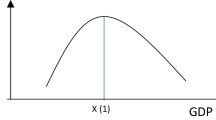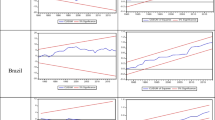Abstract
China has consumed relatively high energy consumption and large carbon emitters since the 2000s compared to other emerging countries. This study explores the impact of non-economic factors on energy consumption and CO2 emissions in China from 1991 to 2019. By using a linear autoregressive distributed lagged (ARDL) bounds testing approach for a cointegration link between non-economic factors, energy consumption, and CO2 emissions. The result shows that education, law and order, and social globalization have negative impact on energy consumption and CO2 emissions in long run. The results show that population growth exerts positive pressure on energy consumption and CO2 emissions. The impact of non-economic factors in energy consumption and CO2 emissions are also likely to be evident in the future. The findings of this study can be valuable to authorities and policymakers in the terms of installing clean energy and green economy.




Similar content being viewed by others
Data availability
The datasets used and/or analyzed during the current study are available from the corresponding author on reasonable request.
Notes
Corruption is an assessment within the political system and takes actual or potential corruption into account. ICRG index is prepared annually and ranges from 0 (highest degree of corruption means totally corrupt) to 6 (lowest degree of corruption means not corrupt).
References
Abid M (2016) Impact of economic, financial, and institutional factors on CO2 emissions: evidence from Sub-Saharan Africa economies. Util Policy 41:85–94. https://doi.org/10.1016/j.jup.2016.06.009
Ahmed Z, Wang Z (2019) Investigating the impact of human capital on the ecological footprint in India: an empirical analysis. Environ Sci Pollut Res 26(26):26782–26796
Ahmed Z, Wang Z, Mahmood F, Hafeez M, Ali N (2019) Does globalization increase the ecological footprint? Empirical evidence from Malaysia. Environ Sci Pollut Res 26(18):18565–18582
Ahmed Z, Zafar MW, Ali S (2020) Linking urbanization, human capital, and the ecological footprint in G7 countries: an empirical analysis. Sustain Cities Soc 55:102064
Ahmed Z, Nathaniel SP, Shahbaz M (2021) The criticality of information and communication technology and human capital in environmental sustainability: evidence from Latin American and Caribbean countries. J Clean Prod 286:125529
Akhbari R, Nejati M (2019) The effect of corruption on carbon emissions in developed and developing countries: empirical investigation of a claim. Heliyon 5(9):e02516
Akram V, Jangam BP, Rath BN (2019) Does human capital matter for reduction in energy consumption in India? Int J Energy Sector Manag 13:359–376
Aslam B, Hu J, Majeed MT, Andlib Z, Ullah S (2021) Asymmetric macroeconomic determinants of CO2 emission in China and policy approaches. Environ Sci Pollut Res:1–14
Baloch MA, Wang B (2019) Analyzing the role of governance in CO2 emissions mitigation: the BRICS experience. Struct Chang Econ Dyn 51:119–125
Bano S, Zhao Y, Ahmad A, Wang S, Liu Y (2018) Identifying the impacts of human capital on carbon emissions in Pakistan. J Clean Prod 183:1082–1092
Chatti W (2020) Information and communication technologies, road freight transport, and environmental sustainability. Environ Econ 11(1):124–132
Desha C, Robinson D, Sproul A (2015) Working in partnership to develop engineering capability in energy efficiency. J Clean Prod 106:283–291
Destek MA (2020) Investigation on the role of economic, social, and political globalization on environment: evidence from CEECs. Environ Sci Pollut Res 27(27):33601–33614
Dincer OC, Fredriksson PG (2018) Corruption and environmental regulatory policy in the United States: does trust matter? Resour Energy Econ 54:212–225
Goetz SJ, Debertin DL, Pagoulatos A (1998) Human capital, income, and environmental quality: a state-level analysis. Agri Resour Econ Rev 27(1203-2016-94938):200–208
Greenidge K, McIntyre M, Yun H (2016) Structural reform and growth: what really matters? Evidence from the Caribbean IMF Work Pap 16:1. https://doi.org/10.5089/9781484321812.001
Hassan ST, Baloch MA, Mahmood N, Zhang J (2019) Linking economic growth and ecological footprint through human capital and biocapacity. Sustain Cities Soc 47:101516
Jafri MAH, Liu H, Majeed MT, Ahmad W, Ullah S, Xue R (2020) Physical infrastructure, energy consumption, economic growth, and environmental pollution in Pakistan: an asymmetry analysis. Environ Sci Pollut Res:1–11
Javorcik BS, Wei SJ (2009) Corruption and cross-border investment in emerging markets: firm-level evidence. J Int Money Financ 28(4):605–624
Jia J, Gong Z, Xie D, Chen J, Chen C (2018) Analysis of drivers and policy implications of carbon dioxide emissions of industrial energy consumption in an underdeveloped city: the case of Nanchang, China. J Clean Prod 183:843–857
Khan Z, Ali S, Dong K, Li RYM (2021) How does fiscal decentralization affect CO2 emissions? The roles of institutions and human capital. Energy Econ 94:105060
Lange S, Pohl J, Santarius T (2020) Digitalization and energy consumption. Does ICT reduce energy demand? Ecol Econ 176:106760
Lapatinas A, Litina A, Sartzetakis ES (2019) Environmental projects in the presence of corruption. Int Tax Public Financ 26(1):103–144
Leal PH, Marques AC (2019) Are de jure and de facto globalization undermining the environment? Evidence from high and low globalized EU countries. J Environ Manag 250:109460
Li P, Ouyang Y (2019) The dynamic impacts of financial development and human capital on CO2 emission intensity in China: an ARDL approach. J Bus Econ Manag 20(5):939–957
Majeed MT (2018) Information and communication technology (ICT) and environmental sustainability in developed and developing countries. Pak J Commer Soc Sci 12(3):758–783
Majeed MT, Mazhar M (2020) Reexamination of environmental Kuznets curve for ecological footprint: the role of biocapacity, human capital, and trade. Pak J Commer Soc Sci 14(1):202–254
Muhammad S, Long X (2021) Rule of law and CO2 emissions: a comparative analysis across 65 belt and road initiative (BRI) countries. J Clean Prod 279:123539
Narayan PK (2005) The saving and investment nexus for China: evidence from cointegration tests. Appl Econ 37(17):1979–1990
Ozturk I, Al-Mulali U, Solarin SA (2019) The control of corruption and energy efficiency relationship: an empirical note. Environ Sci Pollut Res 26(17):17277–17283
Panayotou T (1997) Demystifying the environmental Kuznets curve: turning a black box into a policy tool. Environ Dev Econ 2:465–484. https://doi.org/10.1017/S1355770X97000259
Pata UK, Caglar AE (2021) Investigating the EKC hypothesis with renewable energy consumption, human capital, globalization and trade openness for China: evidence from augmented ARDL approach with a structural break. Energy 216:119220
Pei Y, Zhu Y, Wang N (2021) How do corruption and energy efficiency affect the carbon emission performance of China’s industrial sectors? Environ Sci Pollut Res:1–18
Pellegrini L, Gerlagh R (2006) Corruption, democracy, and environmental policy: an empirical contribution to the debate. J Environ Dev 15(3):332–354
Pesaran MH, Shin Y, Smith RJ (2001) Bounds testing approaches to the analysis of level relationships. J Appl Econ 16(3):289–326
Saha S, Gounder R (2013) Corruption and economic development nexus: variations across income levels in a non-linear framework. Econ Model 31:70–79
Salman M, Long X, Dauda L, Mensah CN (2019) The impact of institutional quality on economic growth and carbon emissions: Evidence from Indonesia, South Korea and Thailand. J Clean Prod 241:118331
Samimi AJ, Abedini M, Abdollahi M (2012) Corruption and inflation tax in selected developing countries. Middle-East J Sci Res 11(3):391–395
Shahbaz M, Bhattacharya M, Ahmed K (2017) CO2 emissions in Australia: economic and non-economic drivers in the long-run. Appl Econ 49(13):1273–1286
Shahbaz M, Mallick H, Mahalik MK, Loganathan N (2015) Does globalization impede environmental quality in India? Ecol Indic 52:379–393
Sohail MT, Ullah S, Majeed MT, Usman A (2021) Pakistan management of green transportation and environmental pollution: a nonlinear ARDL analysis. Environ Sci Pollut Res:1–10
Swaleheen M (2008) Corruption and saving in a panel of countries. J Macroecon 30(3):1285–1301
Udemba EN, Magazzino C, Bekun FV (2020) Modeling the nexus between pollutant emission, energy consumption, foreign direct investment, and economic growth: new insights from China. Environ Sci Pollut Res:1–12
Usman A, Ozturk I, Hassan A, Zafar SM, Ullah S (2021) The effect of ICT on energy consumption and economic growth in South Asian economies: an empirical analysis. Telemat Inform 58:101537
Welsch H (2004a) Corruption, growth, and the environment: a cross-country analysis. Environ Dev Econ 9:663–693
Welsch H (2004b) Corruption, growth, and the environment: a cross-country analysis. Environ Dev Econ 9(5):663–693. https://doi.org/10.1017/S1355770X04001500
World Bank (2021) World development indicators 2021. World Bank Publications
Xu G, Schwarz P, Yang H (2020) Adjusting energy consumption structure to achieve China’s CO2 emissions peak. Renew Sust Energ Rev 122:109737
Yao Y, Ivanovski K, Inekwe J, Smyth R (2020) Human capital and CO2 emissions in the long run. Energy Econ 91:104907
Zallé O (2019) Natural resources and economic growth in Africa: The role of institutional quality and human capital. Res Policy 62:616–624
Zafar MW, Zaidi SAH, Khan NR, Mirza FM, Hou F, Kirmani SAA (2019) The impact of natural resources, human capital, and foreign direct investment on the ecological footprint: the case of the United States. Res Policy 63:101428
Zen IS, Noor ZZ, Yusuf RO (2014) The profiles of household solid waste recyclers and non-recyclers in Kuala Lumpur, Malaysia. Habitat International 42:83–89
Zhao W, Zhong R, Sohail S, Majeed MT, Ullah S (2021) Geopolitical risks, energy consumption, and CO 2 emissions in BRICS: an asymmetric analysis. Environ Sci Pollut Res:1–12
Author information
Authors and Affiliations
Contributions
This idea was given by Lin Jian. Lin Jian and Muhammad Tariq Majeed analyzed the data and wrote the complete paper, while Muhammad Tayyab Sohail and Sana Ullah read and approved the final version.
Corresponding authors
Ethics declarations
Ethics approval
Not applicable.
Consent to participate
I am free to contact any of the people involved in the research to seek further clarification and information.
Consent for publication
Not applicable.
Competing interests
The authors declare no competing interests.
Additional information
Responsible Editor: Roula Inglesi-Lotz
Publisher’s note
Springer Nature remains neutral with regard to jurisdictional claims in published maps and institutional affiliations.
Rights and permissions
About this article
Cite this article
Jian, L., Sohail, M.T., Ullah, S. et al. Examining the role of non-economic factors in energy consumption and CO2 emissions in China: policy options for the green economy. Environ Sci Pollut Res 28, 67667–67676 (2021). https://doi.org/10.1007/s11356-021-15359-3
Received:
Accepted:
Published:
Issue Date:
DOI: https://doi.org/10.1007/s11356-021-15359-3




